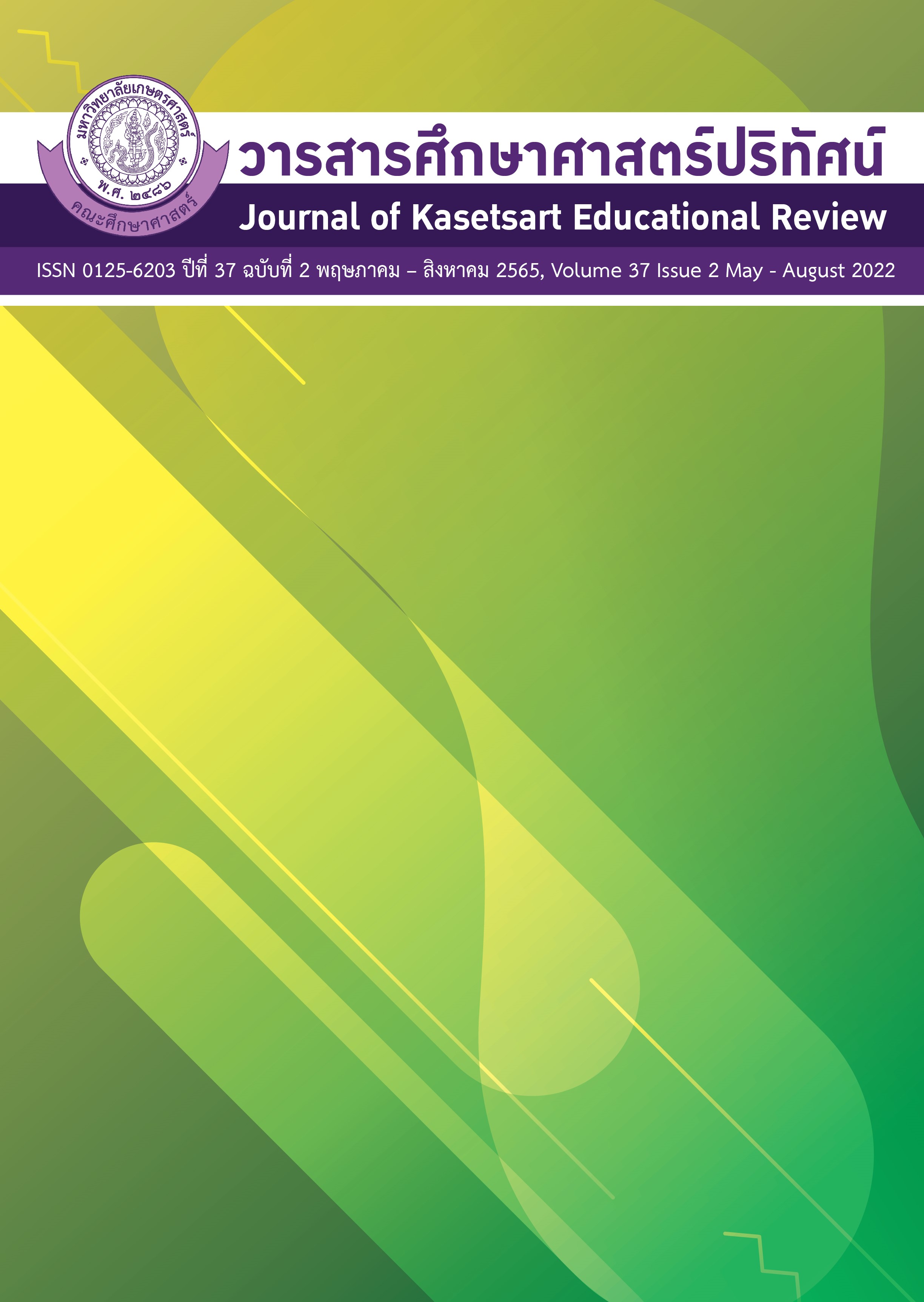ผลการจัดประสบการณ์การเรียนรู้โดยใช้ปรากฏการณ์เป็นฐานที่มีต่อมโนทัศน์ ทางประวัติศาสตร์สำหรับเด็กปฐมวัย
คำสำคัญ:
ปรากฏการณ์เป็นฐาน, มโนทัศน์ทางประวัติศาสตร์, ปฐมวัยบทคัดย่อ
การศึกษานี้มีวัตถุประสงค์เพื่อศึกษาผลการจัดประสบการณ์การเรียนรู้โดยใช้ปรากฏการณ์เป็นฐานที่มีต่อมโนทัศน์ทางประวัติศาสตร์สำหรับเด็กปฐมวัย กลุ่มตัวอย่างแบบเจาะจง คือ เด็กปฐมวัย ชั้นอนุบาลปีที่ 2 ภาคเรียนที่ 2 ปีการศึกษา 2563 โรงเรียนแห่งหนึ่ง ในสังกัดสำนักงานเขตพื้นที่การศึกษาประถมศึกษาสระบุรีเขต 2 จำนวนทั้งหมด 6 คน เครื่องมือที่ใช้ในการวิจัยครั้งนี้ คือ แผนการจัดประสบการณ์โดยใช้ปรากฏการณ์เป็นฐานจำนวน 8 แผน แบบประเมินมโนทัศน์ทางประวัติศาสตร์สำหรับเด็กปฐมวัย สถิติที่ใช้ในการวิเคราะห์ข้อมูลคือ ค่าเฉลี่ย ส่วนเบี่ยงเบนมาตรฐานและการวิเคราะห์เชิงเนื้อหา
ผลการศึกษาพบว่า เด็กปฐมวัยที่ได้รับการจัดประสบการณ์การเรียนรู้โดยใช้ปรากฏการณ์เป็นฐาน มีคะแนนพฤติกรรมการเรียนรู้มโนทัศน์ทางประวัติศาสตร์สูงกว่าก่อนการจัดประสบการณ์การเรียนรู้ทั้งโดยรวมและรายด้าน เด็กมีความสามารถในด้านเรียงลำดับความสำคัญของเหตุการณ์ ด้านการเชื่อมโยงประสบการณ์ในอดีตกับปัจจุบันและอนาคต ด้านคำเฉพาะที่เกี่ยวข้องกับเหตุการณ์ และด้านปรับเปลี่ยนวิธีการแก้ปัญหาจากสถานการณ์ที่เกิดขึ้นจากในอดีตจนถึงปัจจุบันสูงขึ้น
เอกสารอ้างอิง
Chosoongnern, Y. (2019). Build a body of knowledge based on constructivism. Master of Education, Major Field Early Childhood Education, Srinakharinwirot University. [in Thai].
Daehler, K. R., and Folsom, J. (2016). Making Sense of SCIENCE: Phenomena-Based Learning. Retrieved from https://we-mss.weebly.com/uploads /8/6/4 /9/8649828/mss_pbl.pdf
Dougherty, K. (2015). Global Trends in Project Based Learning: From the UK, to Finland and Beyond! Education Insider. Retrieved from https://blog.iat.com/2015/06/26/ new-global-trends-in-project-based-learning/.
Hantrakul, P. (2013). Teaching techniques and the use of innovations in teaching history subjects. in Chatthip Nartsupha and Chalong Soontravanich. (editor). history Religion, Culture and Education Collection of Thai Studies Articles in Remembrance of Professor Ichii Yoneo. First Edition, Bangkok: Dansuttha Printing Company. [in Thai].
Kajornrungsilp, S. (2007). Choose a kindergarten for your beloved child. Bangkok: Publishing Base Publishing. [in Thai].
Khammanee, T. (2010). A variety of alternative teaching styles. Bangkok: Chulalongkorn University Press. [in Thai].
Kompa, J. S. (2017). Remembering Prof. Howard Barrows: Notes on Problem-Based Learning and the School of the Future. Retrieved from https://joanakompa.com/ tag/phenomenon-based-learning/.
Laksana, K. (2015). The development of historical thinking in elementary school: Documentation. Lecture of the 8th Educational Expo for Teacher Professional Development, Bangkok : EDUCA. [in Thai].
Mahawijit, P. (2017). Educational Innovation from Finland. NSTDA magazine, 46(209): 40-45. [in Thai].
Ministry of Education and Research. (2012). Framework Plan for the Content and Tasks of Kindergartens. Oslo: Ministry of Education and Research.
Munkham, S. (2013). Strategies for teaching conceptual thinking. 7th printing, Bangkok: Limited Partnership, Printmaking. [in Thai].
Na Ayudhya, W.I. (2012). Social Studies Teacher and Skill Development for Students. Bangkok: Faculty of Education, Chulalongkorn University, Printing House of Chulalongkorn University. [in Thai].
Nitikhetpreecha, C. (2016). Techniques and methods of teaching history. 6th ed. Bangkok: Publishing House of Chulalongkorn University. [in Thai].
Piaget, J. (1952). The Original of Intelligence in Children. Trans, by Marget Cook. New York: Internayional Universitie Press.
Pitchayachomchuen, N., Angkanaphattakajorn, V., and Jenchit, A. (2015). “The results of the Activities inductive learning with a mathematical concept and mathematical reasoning ability. of students in Grade 4”. Veridian E-Journal, SU. 8(2): 85. [in Thai].
Pongsripian, W. (2000). Teacher and teaching Thai history. Instruction manual history of Thai history: how to learn and teach. 1st ed. Bangkok: Religious Printing Press. [in Thai].
Rüsen, J. (2004). Historical consciousness: Narrative structure, moral function, and ontogenetic development. In: Seixas, P (ed.) Theorizing Historical Consciousness. Toronto, ON, Canada: University of Toronto Press.
Samahito, C. (2019). The organization of a phenomenal-based learning experience for Early childhood. Silpakorn University Journal, 39 (1): 114-129. [in Thai].
Samahito, C. (2020). Developing the ability to manage learning in science and mathematics of graduate students in early childhood education using the phenomenon as a base for media integration electronic lessons. Naresuan University Journal, 23 (1): 104 – 115. [in Thai].
Silander, P. (2015b). Rubric for Phenomenon Based Learning. Retrieved from http://www.phenomenaleducation.info/phenomenon-based-learning.html
Sriphahon, S. (2011). Management of teaching history subjects in educational institutions. Second Edition, Nonthaburi: Sukhothai Thammathirat Open University Press. [in Thai].
ดาวน์โหลด
เผยแพร่แล้ว
ฉบับ
ประเภทบทความ
สัญญาอนุญาต
ลิขสิทธิ์ (c) 2022 วารสารศึกษาศาสตร์ปริทัศน์

อนุญาตภายใต้เงื่อนไข Creative Commons Attribution-NonCommercial-NoDerivatives 4.0 International License.
บทความทุกบทความเป็นลิขสิทธิ์ของวารสารคณะศึกษาศาสตร์ มหาวิทยาลัยเกษตรศาสตร์ วิทยาเขตบางเขน
วารสารศึกษาศาสตร์ปริทัศน์ (Kasetsart Educational Review)






